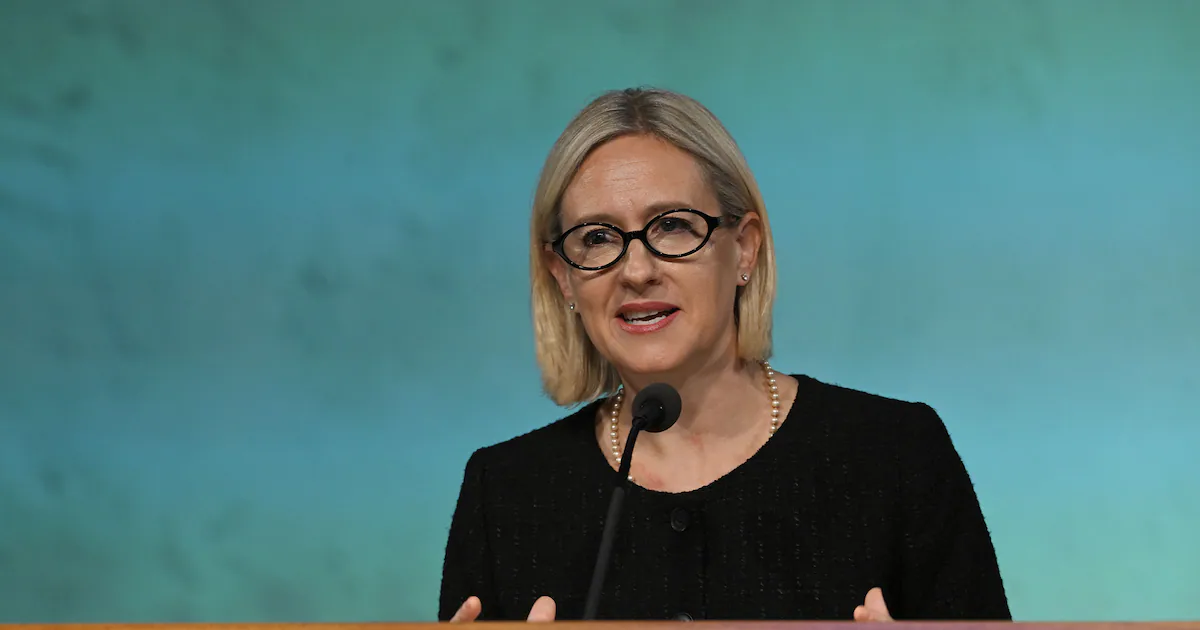Copyright Salt Lake City Deseret News

Governments suffering the catastrophic effects of plunging birthrates must light the fire of faith within their borders, a Catholic economist and demographer said Tuesday at a BYU forum assembly. “The highest motive is to want a child for the child’s own sake. Usually this type of motive is nourished by a living religious tradition,” said Catherine Ruth Pakaluk, a social scientist and economics professor at the Catholic University of America in Washington, D.C. She said choosing to have children, and especially choosing to have more than one child, is a countercultural choice in America today. Pakaluk published a book last year about her journey to conduct in-depth interviews with women who choose to become part of the 5% who have five or more children, “Hannah’s Children: The Women Quietly Defying the Birth Dearth.” Pakaluk practices what she researches, BYU academic vice president Justin Collings said when he introduced her to a crowd at the Marriott Center. She married a widow with six children in 1989, then gave birth to eight children. “It’s not everyday that you meet a Harvard Ph.D. economist who has raised 14 children, but you’re about to do just that,” said Collings, a member of The Church of Jesus Christ of Latter-day Saints whose wife, Leah, has had eight children. Governments around the world are scrambling as their birthrates plunge below the replacement rate of 2.0 children per woman. The results spell big trouble, she said. Fewer children means fewer workers, which leads to economic stagnation, sagging government revenue and more political tension over government spending. Those in turn lead to populism and nationalism. For 15 years, Hungary has spent 5% of its gross domestic product on fertility incentives, but its birthrate last year was 1.38, Pakaluk said. South Korea has the world’s lowest birthrate at 0.75, which is below the 1.0 rate at which a population is cut in half in a single generation. The U.S. birthrate last year was 1.59. “The total number of kids worldwide has already stopped growing, and the total number of people in the world will peak soon — in 25 or 30 years," Pakaluk said. Human losses mount, too, as children are raised with fewer siblings, cousins, aunts and uncles, leading to “accidental” isolation that causes increased loneliness, anxiety and individualism, she said. The answer is to stop asking why women aren’t having children and start asking why some do. BYU’s Wheatley Institute sponsored Pakaluk’s research into that question. Her resulting advice to governments is to adopt “a program of relentless deference to churches as the providers of a public good that nations cannot buy.“ She said political leaders should bring religious believers into policy conversations, learn their world views and ask their advice. “Let churches run schools and pass on their values and don’t spend people’s tax money on things they find evil,” she said. “Give pride of place in law and policy to religious colleges and universities (because) they (produce more) young and fruitful marriages by every measure.” Her argument is rooted in economics. Large families once were an economic necessity. Multiple children provided parents with help, labor and support in old age. Having children was the province of marriages. Today, children have been replaced by labor-saving and government support programs. “Children are useless for the household,” Pakaluk said. “The reason birth rates are really falling is because no one needs a child — and fewer and fewer people want one," she said. “Like horses, children have suffered an economic wound. They’ve been replaced by other easier, cheaper, better ways to meet organic human needs. So the reasons to have a kid — the gains — for most people don’t outweigh those hefty personal costs." Today, people have children only because they want them. Some want to be parents, but having a single child satisfies that self-centered want, Pakaluk said. Religious faith is the spark that causes women to have more children. “Children aren’t needed,” she said, “but children can be wanted for their own sakes — and are wanted — by people with very specific beliefs about children, illuminated by the fire of faith." The women Pakaluk met wanted children badly because they believe they are blessings from God, expressions of divine goodness and a vital purpose of their marriages. “They believe children are like health and wealth,” she said. “You can’t have too much of any of those things.” Pakaluk said it is an empirical fact that only the highest motive of wanting children brings about above-replacement fertility rates, “because if every child is a unique, unrepeatable blessing with a destiny only he or she can fulfill — there’s no limit to how many you could want.” Leah, an accomplished musician, told Pakaluk that each child brings a different, divine gift to the world that makes her self-sacrifice and work worth it and that brings happiness to her marriage. For her, motherhood evolved into providing gifts to the world. “It’s almost like radical and feminist to say that my contribution is healthy, well-balanced children and that is a contribution,” Leah said. “Like it’s not just about my music career or how much money we make or any of that, really. Those are all secondary to what you contribute to the world, which is the future of humanity.” Pakaluk said the conviction of religious women and couples that marriage is holy and children are “wantable” leads them to lead countercultural lives. That is why she suggests governments support religions over other policy incentives for births. “The fire of faith is the antivenom to this economic wound children now bear,” she said. “The ordinary calculus of the world subordinates children to adult needs. By the fire of faith, our hearts are softened and our selfishness burned away. By its light we seek children when the world seeks comfort, we live for the eternal and not for the present, we discern in the cross the plow of new life.”



